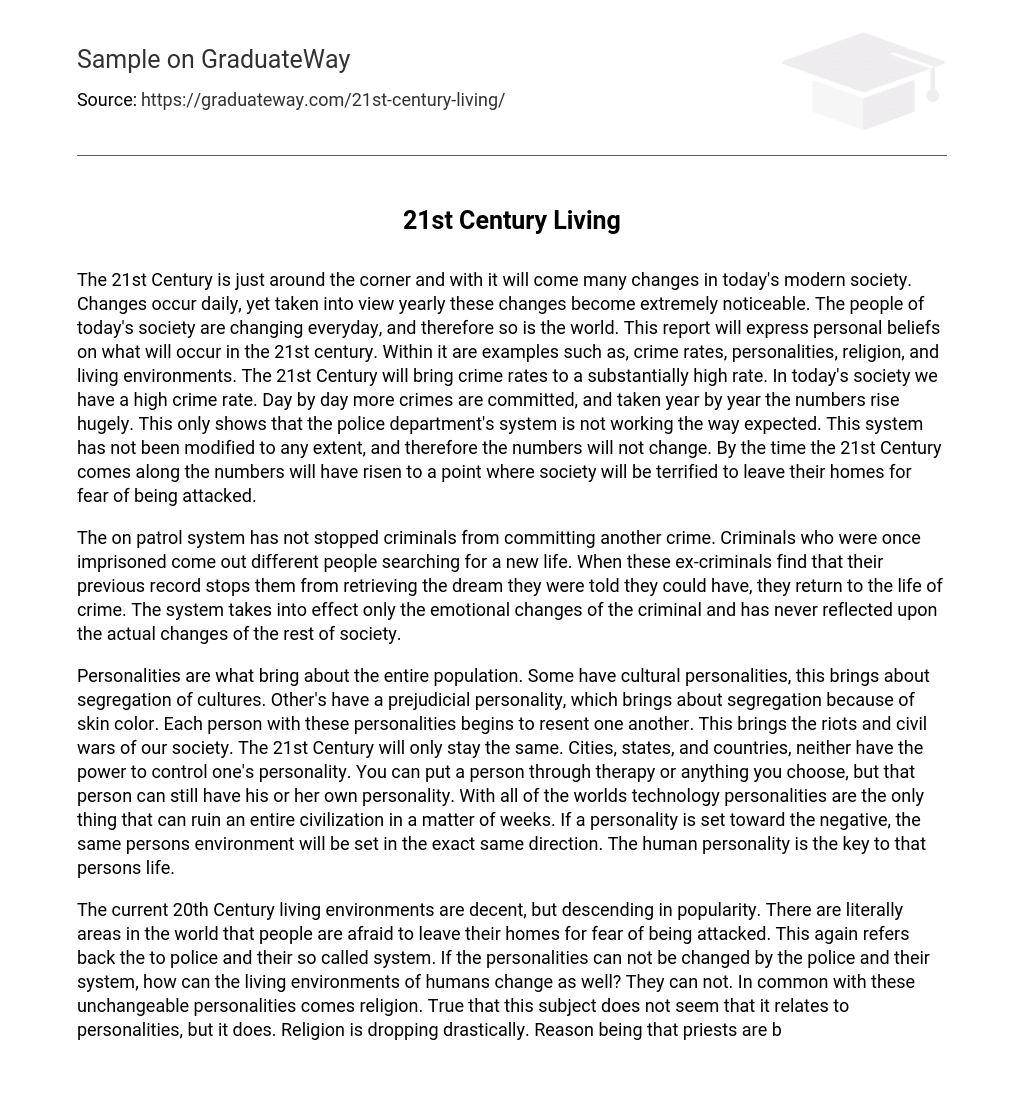The 21st Century is approaching soon and it will bring numerous changes to modern society. These changes are noticeable when viewed annually. Both people and the world are constantly changing. This report will discuss personal beliefs about what will happen in the 21st century, including crime rates, personalities, religion, and living environments.
In the 21st Century, crime rates will reach a significantly high level. Currently, our society already has a high crime rate that increases daily and drastically over time. This demonstrates that the police department’s system is not functioning as expected. Since this system hasn’t been modified at all, the numbers won’t change either. By the time we reach the 21st Century, crime rates will be so alarming that society will be too scared to leave their homes for fear of being assaulted.
The on patrol system has failed to prevent repeat criminal offenses. Individuals who have previously served time in prison often emerge transformed, seeking a fresh start. However, when these ex-convicts discover that their past record hinders their pursuit of the promised dreams, they turn back to a life of crime. The system focuses solely on the emotional changes within the criminal, neglecting to consider the actual impact on society as a whole.
Personality is the driving force behind the diversity within our population, leading to cultural and prejudicial segregation. These differing personalities breed resentment among individuals, resulting in societal riots and civil wars, a pattern that is likely to persist in the 21st century. The control over one’s personality lies beyond the reach of cities, states, and countries. Despite efforts such as therapy, an individual’s personality remains intact. In today’s world, where technology prevails, it is alarming how quickly personalities can singlehandedly destroy an entire civilization in a matter of weeks. If a person’s personality leans towards negativity, their environment will inevitably follow suit. Ultimately, an individual’s personality serves as the key to their life.
The living environments of the 20th Century are currently satisfactory, although they are losing popularity. In certain regions, fear of attacks restrains people from leaving their homes due to concerns regarding the police and their system. If the police and their system cannot alter individuals’ personalities, it becomes impossible for human living environments to change as well. Furthermore, religion is impacted by these unalterable personalities, resulting in a rapid decline with fewer priests available. The existing priests belong to an older generation without any young successors. Young individuals opt not to pursue priesthood as they wish to avoid conforming to the stereotype of being antiquated and out-of-touch. Stereotypes and peer pressure foster false beliefs.
The younger generation today desires to get married and have children, but they face numerous restrictions imposed by the priesthood. Unfortunately, they have not been prepared for such restrictions and lack the necessary patience to adhere to them. This predicament poses a religious problem that can be readily resolved. By organizing a simple meeting that promotes more freedom within the priesthood, the Vatican can demonstrate their belief in family values and their trust that individuals can both have a family and maintain their devotion to God.
To make the 21st Century distinct from the present, change is essential but not impossible. The crucial elements of faith, hope, and determination are required to transform crime rates, personalities, religion, and living environments. The fate of the future century relies entirely on the actions taken in the following decade. It is only through collective efforts that we can enhance humanity’s prospects for a better future; this challenge exceeds any previous global endeavors.





